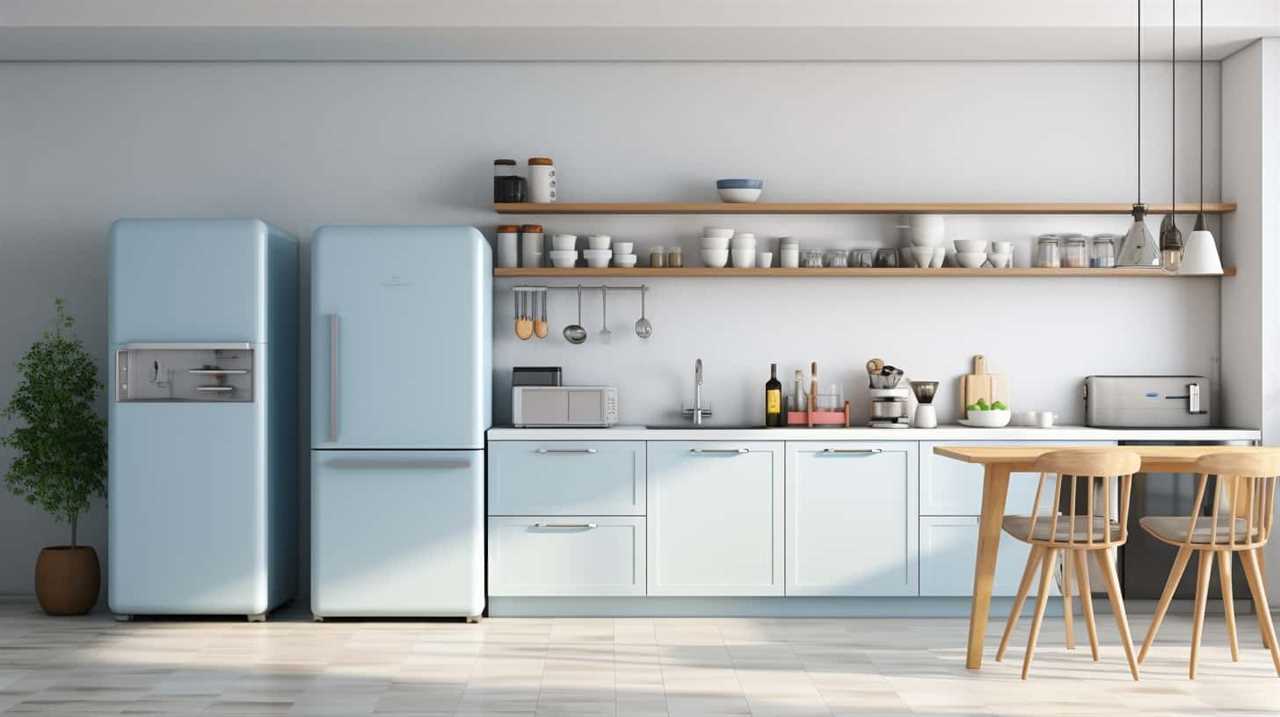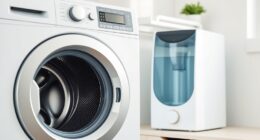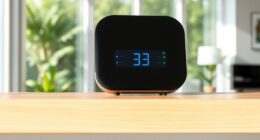We, as individuals who are conscious about energy usage and strive for excellence, are well aware of the high levels of energy consumed by our household appliances.
Brace yourselves, for we are about to embark on a data-driven journey, exploring the relentless energy guzzlers lurking within our homes.
From the mighty refrigerators that dutifully preserve our sustenance, to the power-hungry air conditioners that keep us cool in the scorching heat, and the laundry warriors like washing machines and clothes dryers, we shall uncover the true culprits behind our soaring energy bills.
Prepare to be enlightened!

Key Takeaways
- Refrigerators consume a significant amount of energy.
- Air conditioners account for a significant portion of household energy consumption.
- Electric water heaters are known to be one of the highest energy-consuming appliances.
- Electric stoves are one of the most energy-consuming appliances.
Refrigerators
Refrigerators consume a significant amount of energy in our homes. Proper refrigerator maintenance is crucial to ensure optimal energy efficiency.
One of the most effective energy-saving tips is to set the temperature of your refrigerator between 35 and 38 degrees Fahrenheit (2 to 3 degrees Celsius). This range maintains food safety while reducing energy consumption.
Additionally, regularly cleaning the condenser coils can improve efficiency by allowing the refrigerator to expel heat more effectively. It’s also important to ensure proper door seals to prevent cold air from escaping.
Air Conditioners
Air conditioners account for a significant portion of our household energy consumption. As energy-efficient options become increasingly popular, it’s important to consider alternative cooling methods and energy-saving tips for air conditioners.

One alternative to traditional air conditioning is evaporative cooling, which uses water to cool the air. This method can be more energy-efficient, especially in dry climates.
Another option is to use ceiling fans or portable fans in conjunction with air conditioning. By circulating the cooled air, fans can help reduce the workload on the air conditioner and save energy.
Additionally, proper insulation and sealing of windows and doors can prevent cool air from escaping and hot air from entering, allowing the air conditioner to operate more efficiently.
Regular maintenance, such as cleaning or replacing air filters, can also improve the efficiency of air conditioners.

Washing Machines
When it comes to household energy consumption, one appliance that uses a significant amount of energy is the washing machine. Here are three key points to consider when it comes to washing machines and energy conservation:
- Energy Efficient Models: Look for washing machines with an Energy Star certification. These models are designed to use less energy and water, which can result in significant savings over time.
- Alternative Washing Methods: Consider using alternative washing methods such as hand washing or utilizing a laundromat for larger loads. These methods can help reduce energy usage, especially if you have older, less efficient washing machines.
- Water and Energy Conservation: Be mindful of how you use your washing machine. Only run full loads to maximize efficiency, use cold water when possible, and opt for shorter wash cycles. Additionally, air drying your clothes instead of using a dryer can further reduce energy consumption.
Electric Water Heaters
When comparing energy consumption, electric water heaters are known to be one of the highest energy-consuming appliances in most households. Their efficiency and cost depend on factors such as insulation, tank size, and usage patterns.
However, there are alternative options available, such as tankless water heaters and solar water heaters, which can offer higher energy efficiency and lower operating costs.
Energy Consumption Comparison
To compare the energy consumption of electric water heaters, we’ll examine their usage over a specified time period. This analysis will help us determine the efficiency of electric water heaters and provide valuable insights for consumers looking to reduce their energy consumption.

Here are three key factors to consider:
- Electric Vehicle Charging: Electric water heaters can account for a significant portion of energy usage, especially when utilized for electric vehicle charging. By monitoring the energy consumed during the charging process, we can identify opportunities for optimization and explore alternative charging solutions.
- Solar Panel Efficiency: Incorporating solar panels into the water heating system can have a substantial impact on energy consumption. By analyzing the efficiency of these panels, we can evaluate the potential energy savings and encourage the adoption of renewable energy sources.
- Time-of-Use Rates: Electric water heaters can benefit from time-of-use rates, which provide lower electricity prices during off-peak hours. By utilizing these rates effectively, consumers can reduce their energy costs and contribute to overall energy conservation.
Efficiency and Cost
Now let’s delve into the efficiency and cost of electric water heaters. When it comes to electric water heaters, it’s important to consider both their efficiency rating and the cost of operation. An efficiency rating measures how well a water heater converts energy into hot water. The higher the rating, the more efficient the water heater is, resulting in lower energy consumption and cost. To help you make an informed decision, here is a table comparing the efficiency ratings and estimated annual energy costs of three popular electric water heaters:
| Water Heater Model | Efficiency Rating | Estimated Annual Energy Cost |
|---|---|---|
| Model A | 0.90 | $300 |
| Model B | 0.85 | $350 |
| Model C | 0.95 | $275 |
Alternative Heating Options
As we explore alternative heating options for electric water heaters, it’s important to consider their effectiveness and energy consumption. Here are three alternative heating options for electric water heaters that are both energy efficient and cost-effective:
- Heat Pump Water Heaters: These systems use electricity to move heat from the air or ground to heat the water. They’re highly efficient, with energy savings of up to 50% compared to conventional electric water heaters. Heat pump water heaters also have a longer lifespan and can reduce greenhouse gas emissions.
- Solar Water Heaters: By harnessing the power of the sun, solar water heaters can provide hot water while significantly reducing energy consumption. These systems use solar collectors to heat the water, which is then stored in an insulated tank. While the upfront cost may be higher, solar water heaters can provide substantial energy savings in the long run.
- Tankless Water Heaters: Unlike traditional storage tank water heaters, tankless water heaters heat the water on-demand, eliminating the need for standby heat loss. This makes them highly efficient and energy-saving. Tankless water heaters are also compact and can be installed closer to the point of use, reducing heat loss in long pipe runs.
Clothes Dryers
Clothes dryers consume a significant amount of energy. According to data, these appliances are responsible for approximately 6% of the total energy used in a typical household. However, there are alternative drying methods that can help reduce energy consumption.

One option is air drying clothes outdoors, which requires no electricity at all. Another alternative is using a clothesline or drying rack indoors. These methods not only save energy but also help to extend the lifespan of your clothes by reducing wear and tear from the heat of a dryer.
To further save energy, consider using a moisture sensor in your dryer, which automatically shuts off the machine when the clothes are dry.
Transitioning to the next subtopic, let’s now explore the energy usage of dishwashers.
Dishwashers
Moving on to dishwashers, these appliances are another major contributor to household energy consumption. When it comes to choosing an energy-efficient dishwasher, there are a few key factors to consider:

- Efficiency ratings: Look for dishwashers with high energy efficiency ratings. These ratings can help you compare different models and determine which ones consume less energy. The Energy Star label is a reliable indicator of energy efficiency.
- Water usage: Dishwashers that use less water can also contribute to energy savings. Look for models that have low water consumption per cycle. This not only reduces the amount of water wasted but also the energy required to heat that water.
- Load capacity: Opt for a dishwasher that matches your household’s needs. Overloading the dishwasher can decrease its efficiency and require additional cycles, resulting in higher energy consumption.
Electric Ovens
Now let’s shift our focus to electric ovens, which are another significant consumer of household energy. Electric ovens are commonly used for baking, roasting, and broiling, making them an essential appliance in many kitchens. However, their energy consumption can be quite high.
To mitigate this, it’s important to explore alternative cooking methods that can reduce the reliance on electric ovens. For example, using a microwave or a toaster oven for smaller meals can significantly save energy.
Additionally, investing in energy-saving oven models can make a substantial difference. These models often come with features like better insulation, efficient heating elements, and programmable settings to optimize energy usage.
Desktop Computers
Desktop computers are one of the most power-hungry appliances in our homes. When it comes to desktop computer efficiency, it’s important to consider their power consumption. Here are three key factors that contribute to the power consumption of desktop computers:

- Processor: The processor is the heart of a computer and consumes a significant amount of power. Higher-performance processors tend to consume more energy.
- Graphics card: If you use your desktop computer for gaming or graphic-intensive tasks, a powerful graphics card is essential. However, high-performance graphics cards consume more power.
- Accessories: Peripherals such as monitors, printers, and speakers connected to your desktop computer also contribute to its overall power consumption. It’s important to choose energy-efficient accessories to minimize energy usage.
Transition: Now that we’ve discussed desktop computer power consumption, let’s move on to another energy-consuming appliance in our homes – televisions.
Televisions
Continuing our exploration of energy-consuming appliances, televisions are another significant contributor to power consumption in our homes.
When it comes to energy consumption, screen size plays a crucial role. Larger televisions generally consume more energy than smaller ones. This is because larger screens require more power to produce brighter and more vibrant images.
However, thanks to advancements in technology, many televisions now come with energy-saving features. These features allow users to adjust the brightness and contrast settings, reducing energy consumption without compromising on picture quality.

Additionally, some televisions have built-in sensors that automatically adjust the screen’s brightness based on the ambient lighting conditions, further optimizing energy usage.
Therefore, choosing a television with energy-saving features and considering the screen size carefully can help minimize the energy consumption of this popular household appliance.
Electric Stoves
Electric stoves are one of the most energy-consuming appliances in our homes. Here are three key points to consider about electric stoves:
- Energy Consumption: Electric stoves use a significant amount of electricity, making them one of the most energy-intensive appliances in our kitchens. On average, electric stoves consume around 2400 watts per hour, which can add up quickly over time.
- Environmental Impact: The high energy consumption of electric stoves contributes to increased greenhouse gas emissions, as most electricity is generated from fossil fuels. This environmental impact highlights the importance of exploring alternative cooking methods that are more energy-efficient and sustainable.
- Alternative Cooking Methods: To reduce energy consumption and minimize the environmental impact, it’s worth considering alternative cooking methods such as induction cooktops or gas stoves. Induction cooktops, for example, are more energy-efficient as they directly heat the cookware, resulting in faster cooking times and less wasted heat.
Electric Kettles
Which appliances consume the most energy in our homes? While electric stoves are notorious energy guzzlers, electric kettles also have a significant impact on our energy usage. Electric kettles are commonly used for boiling water and are a staple in many households. However, their convenience comes at a cost. The table below illustrates the energy consumption of electric kettles compared to other appliances:

| Appliance | Energy Consumption (kWh) |
|---|---|
| Electric Kettle | 0.1 – 0.15 |
| Dishwasher | 1.5 – 2.5 |
| Clothes Dryer | 2.5 – 4.5 |
| Electric Oven | 2.5 – 5.0 |
| Air Conditioner | 2.5 – 5.5 |
As seen from the table, electric kettles have relatively lower energy consumption compared to other appliances. However, it is important to consider alternative heating methods, such as using a gas stove or a stovetop kettle, to reduce their impact on environmental sustainability. Making conscious choices about our energy usage can contribute to a more sustainable future.
Microwaves
Let’s now turn our attention to microwaves, another appliance that has a significant impact on energy consumption in our homes. Here are three important factors to consider when it comes to microwave usage:
- Microwave safety:
- Always ensure that your microwave is in good condition and properly grounded to prevent electrical hazards.
- Avoid using metal or aluminum foil in the microwave, as it can cause sparks and damage the appliance.
- Additionally, make sure to use microwave-safe containers and follow the manufacturer’s instructions for cooking and reheating food.
- Efficient cooking tips:
- To reduce energy consumption, use the microwave for smaller cooking tasks instead of the oven or stovetop.
- Microwave ovens are more energy-efficient when it comes to heating or reheating small portions of food.
- Use the appropriate power setting for your task, and consider using a microwave-safe cover or lid to retain heat and speed up cooking time.
- Energy-saving features:
- Look for microwaves with energy-saving features such as power-saving mode or auto-shutoff timers.
- These features help reduce energy consumption when the microwave isn’t in use or when the cooking time is complete.
- Additionally, choose microwaves with a smaller wattage if you don’t require high power for your everyday cooking needs.
Gaming Consoles
Gaming consoles can significantly contribute to high energy consumption in our homes. These devices are designed to provide an immersive gaming experience, but their energy usage can be quite substantial. On average, a gaming console can consume around 90-150 watts of power during gameplay, depending on the model and settings. This energy consumption can add up over time, especially for avid gamers who spend hours playing each day.
However, many gaming consoles now come with energy-saving features to help reduce their impact on electricity bills. These features include power-saving modes, automatic shut-off timers, and low-power standby options. By utilizing these energy-saving features and being mindful of our gaming habits, we can minimize the energy usage of our gaming consoles and contribute to a more sustainable household.

Now, let’s move on to the next section where we’ll discuss the energy usage of vacuum cleaners.
Vacuum Cleaners
When considering vacuum cleaners, it’s important to explore energy-efficient options. These models can help reduce electricity bills by consuming less energy during operation.
Additionally, it’s crucial to assess the cleaning performance of a vacuum cleaner in relation to its energy usage, as some models may offer superior cleaning capabilities while still being energy efficient.
Energy-Efficient Vacuum Options
Energy-efficient vacuum options provide a sustainable solution for effective cleaning. When it comes to choosing an energy-efficient vacuum cleaner, there are several options available that not only help reduce energy consumption but also offer other benefits.

Here are three energy-efficient vacuum options to consider:
- Bagless Vacuums: These vacuum cleaners eliminate the need for disposable bags, reducing waste and saving money in the long run. They use cyclonic technology to separate dirt and dust from the air, maintaining suction power and ensuring efficient cleaning.
- HEPA Filters: Vacuum cleaners equipped with HEPA (High-Efficiency Particulate Air) filters capture tiny particles, including allergens and pollutants, ensuring cleaner indoor air quality. By using a vacuum with a HEPA filter, you can reduce allergies and respiratory issues caused by airborne particles.
- Energy Star Certified Vacuums: Look for vacuum cleaners with the Energy Star label. These models meet strict energy efficiency guidelines set by the Environmental Protection Agency (EPA) and can save up to 40% more energy compared to conventional models.
Impact on Electricity Bills
Moving on to the impact on electricity bills, vacuum cleaners can significantly contribute to energy consumption in the household. It is important to understand the impact of vacuum cleaners on energy consumption and explore ways to reduce electricity bills without compromising cleanliness. Here are some tips to reduce energy consumption:
| Energy-Saving Tip | Description |
|---|---|
| Choose Energy-Efficient Models | Opt for vacuum cleaners with high energy efficiency ratings. Look for models with the Energy Star label. |
| Use the Right Attachment | Select the appropriate attachment for the cleaning task at hand. This ensures efficient cleaning and reduces the need for extended vacuuming sessions. |
| Regular Maintenance | Keep the vacuum cleaner in good working condition by cleaning or replacing filters, emptying dust canisters, and checking for blockages. This helps maintain optimal performance and reduces energy usage. |
| Schedule Cleaning Sessions | Plan vacuuming sessions strategically to cover multiple rooms at once. This eliminates the need for repeated startup and shutdown, saving energy in the process. |
Implementing these tips can lead to significant energy savings and lower electricity bills without compromising the cleanliness of your home.
Cleaning Performance and Energy
Now let’s delve into the relationship between cleaning performance and energy usage of vacuum cleaners. When it comes to cleaning performance, there are a few key factors to consider.

- Suction power: A vacuum cleaner with high suction power can effectively pick up dirt and debris from various surfaces, ensuring a thorough clean. This allows for fewer passes over the same area, ultimately saving energy.
- Filtration system: A good filtration system not only improves indoor air quality but also enhances cleaning performance. It prevents dust and allergens from being released back into the air, reducing the need for repeated cleaning and improving energy efficiency.
- Brushroll design: The brushroll plays a crucial role in agitating and loosening dirt from carpets and rugs. An efficient brushroll design can improve cleaning performance by minimizing the time and energy required to remove embedded dirt.
Frequently Asked Questions
How Often Should I Clean the Condenser Coils of My Refrigerator to Maintain Its Energy Efficiency?
To maintain our refrigerator’s energy efficiency, we should clean its condenser coils regularly. This reduces energy consumption and ensures optimal performance. Regular maintenance not only saves energy but also prolongs the lifespan of the appliance.
Are There Any Energy-Saving Features Available in Modern Air Conditioners?
Modern air conditioners offer several energy-saving features, including smart thermostats that optimize temperature settings and energy efficient lighting options. These advancements can significantly reduce energy consumption and enhance overall efficiency.
Can I Use Cold Water for All My Laundry Loads in the Washing Machine to Save Energy?
Using cold water for laundry can save energy. Additionally, considering energy-efficient lighting options can further reduce consumption. These strategies contribute to our goal of mastering energy efficiency and reducing our environmental impact.
Is It More Energy-Efficient to Keep My Electric Water Heater on All the Time or to Turn It off When Not in Use?
Keeping your electric water heater on all the time is less energy-efficient. Turning it off when not in use saves energy. Follow these energy saving tips for water heaters to maximize electric water heater efficiency.

Does Using the "Eco" Mode on My Dishwasher Really Save Energy and Water Compared to Regular Cycles?
Using the ‘quick wash’ option on a dishwasher can save energy and water compared to regular cycles. But how does it compare to washing dishes by hand? Let’s examine the data and explore the technicalities to gain mastery in this subject.
Conclusion
In conclusion, after examining the data, it’s clear that refrigerators, air conditioners, and electric water heaters are among the appliances that consume the most energy.
These findings highlight the importance of energy-efficient alternatives and the need for individuals to make conscious choices in their appliance usage.
By being mindful of our energy consumption, we can contribute to a more sustainable future and reduce our impact on the environment.










